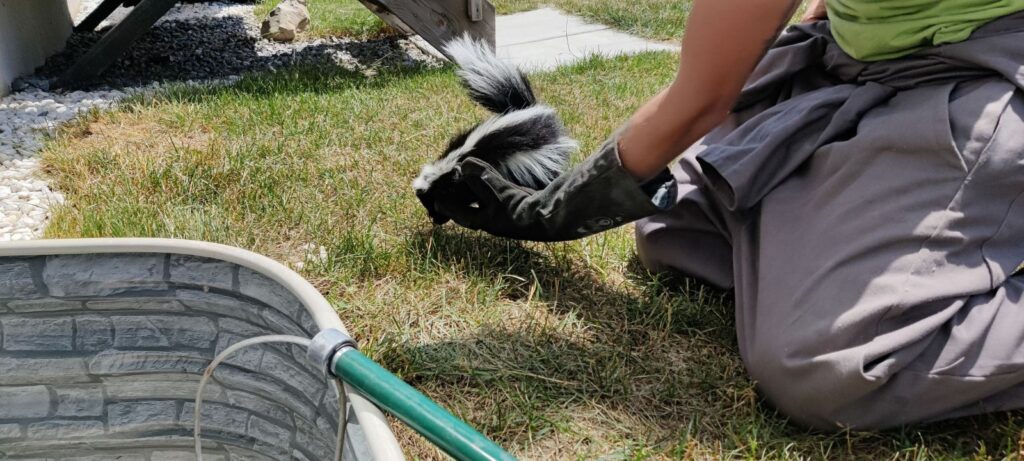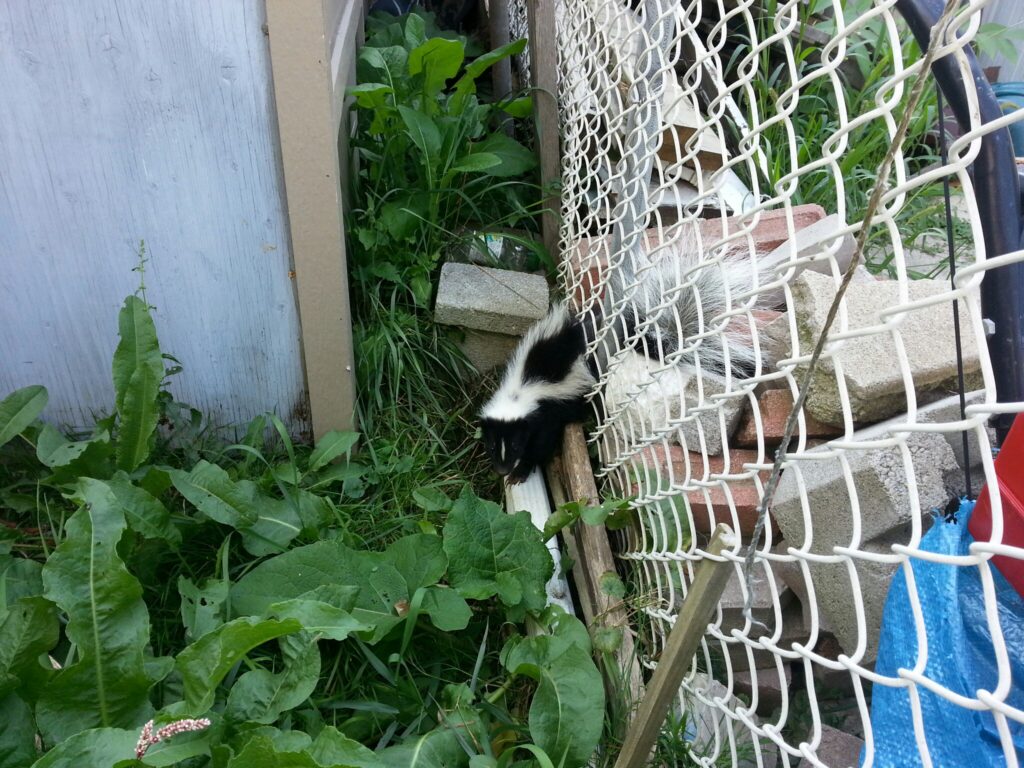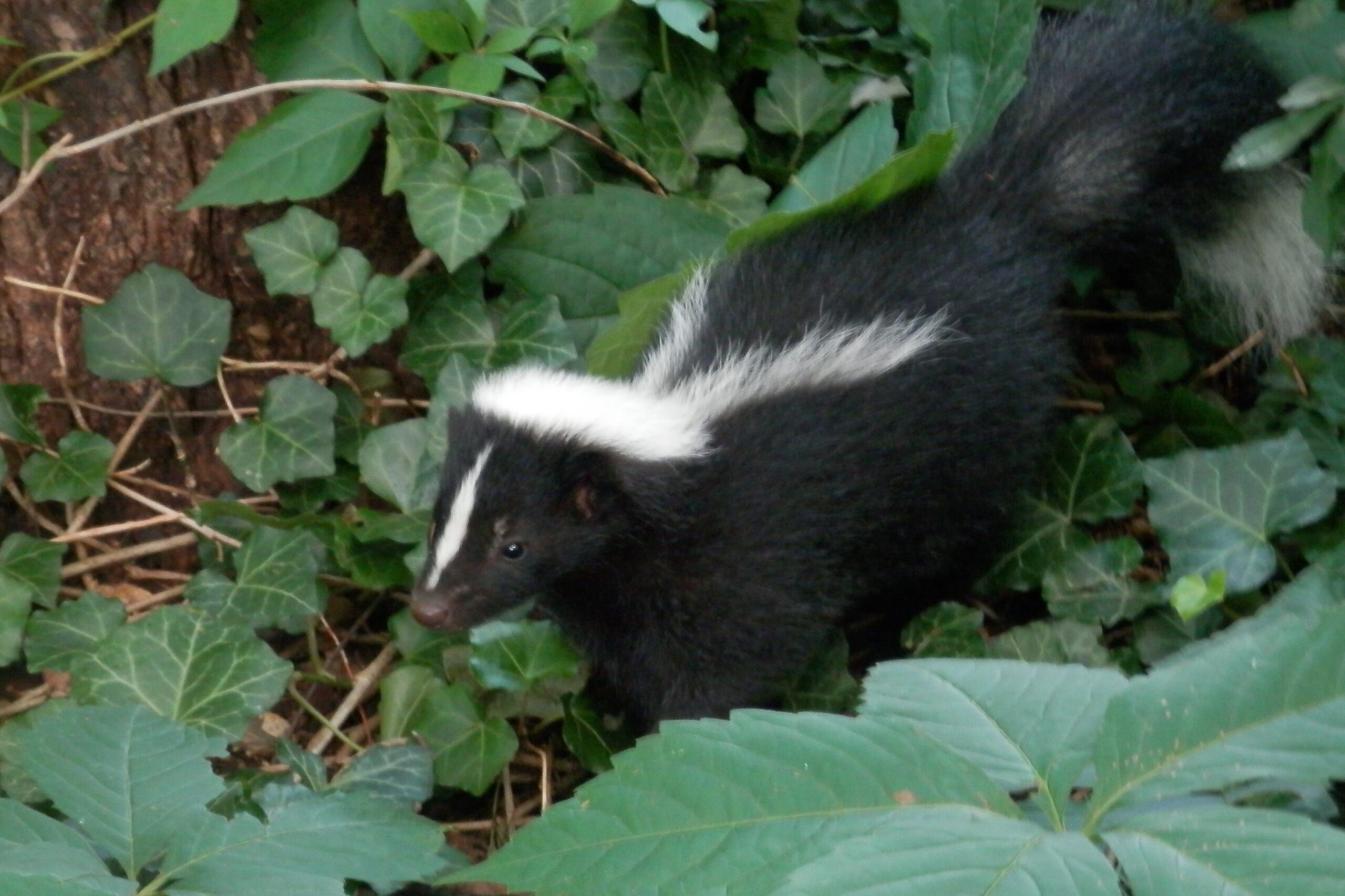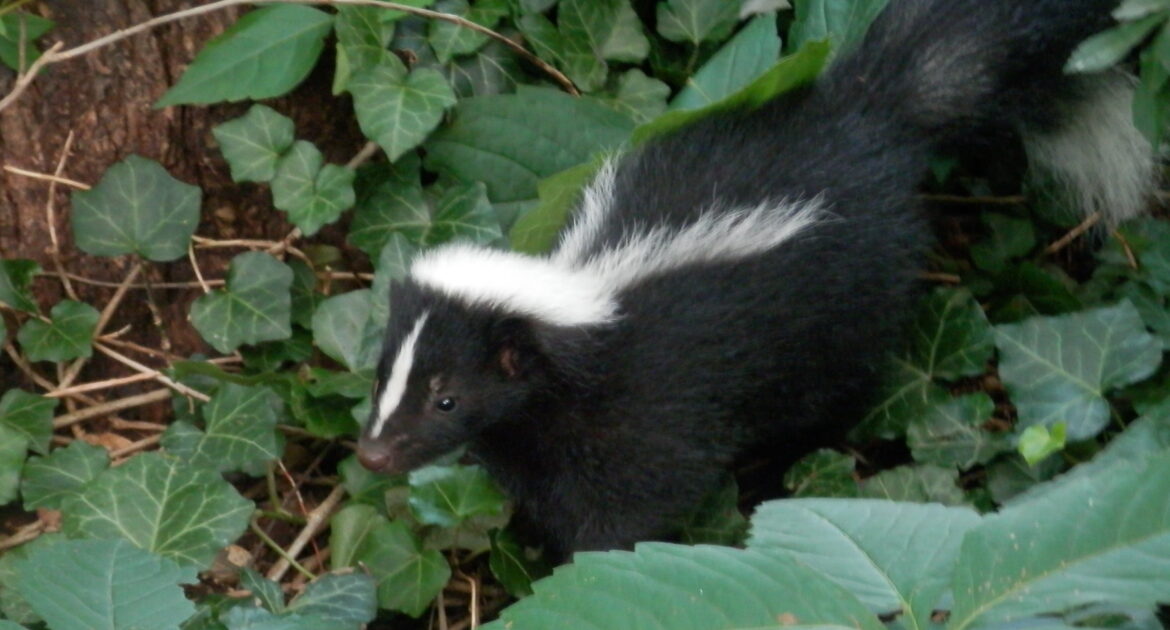As a gardener, you may think of skunks as just an unwelcome intruder that’s bound to make a mess. But did you know that they can be one of your best friends in the garden? There are many skunk benefits you may not be aware of. They are excellent natural pest controllers that can effectively eliminate insects, grubs, and rodents. They also prey on garden pests that can damage your plants, such as slugs and snails. Aside from being a gardener’s ally, they also have numerous benefits in the ecosystem. They help distribute seeds from plants they consume, and their burrows can serve as homes for other wildlife.
However, as much as skunks can be beneficial, it’s important to know when you need to remove them and how to avoid any potential conflicts. In this article, our Skedaddle experts explore what skunks are good for, why controlling pests is important, and when to seek services for skunk removal in Prince George’s County.
Debunking Skunk Myths: More Friend than Foe
In the gardeners’ community, there are numerous misconceptions about skunks that often paint them as more of an adversary than an ally. One of the most pervasive myths is that they are primarily a source of foul odor. While it’s true that they release a strong, musky spray when threatened, they actually prefer to conserve this defense mechanism and use it only as a last resort. So, unless you pose a direct threat to a skunk or its offspring, the likelihood of getting sprayed is minimal.
In reality, they are quiet, shy, and nocturnal creatures. They spend most of their time foraging for food, including insects, larvae, and small mammals such as mice and voles. This diet makes them an unmatched asset in natural pest control. Not only do they reduce the population of unwanted garden pests, but their actions also contribute to the overall health of your soil and plants. As they dig for grubs, they help aerate the soil, improving its texture and nutrient distribution.
What are Skunks Good For?
Given their reputation, you might be surprised to learn that they are a boon to gardeners and make significant contributions to a healthy ecosystem. Skunks are primarily insectivores, extremely effective at controlling garden pests that can cause significant damage to your plants. By devouring large quantities of harmful insects, grubs, and small rodents, skunks can alleviate some of the challenges of maintaining a thriving garden. Let’s delve into more detail about what makes them an integral part of your garden ecosystem.
Master of Natural Pest Control
Skunks are renowned for their insatiable appetites for harmful pests. Their preferred diet consists of grubs, insects, and small rodents, many of which are harmful to gardens and homesteads. Whether it’s the larvae of Japanese beetles, cutworms, or other kinds of harmful insects, skunks work tirelessly at night to reduce these populations significantly.
Moreover, they control the rodent population in your garden by preying on mice, voles, and even rats. Skunks are particularly adept at finding these creatures, thanks to their advanced sense of smell and hearing. So, instead of using harmful chemical pesticides or rodenticides, you can count on the local skunks to significantly reduce these pests in a natural, eco-friendly manner.

Seed Dispersers and Soil Aerators
But there’s more to these animals than just pest control. They are excellent seed dispersers, too. When they snack on plant matter and berries, the seeds go undigested and end up scattered in different parts of their territory. This contributes to the propagation of plant species, essentially utilizing skunks in the reforestation process.
While foraging for food, they dig small holes in the ground, aerating the soil, which can promote root health and water penetration, ultimately beneficial for the vegetation in your garden.
Despite their benefits, it’s crucial for homeowners to maintain a respectful distance from these animals. Professional removal services should be sought if they pose a risk to your home or garden. Here at Skedaddle, we ensure safe and humane wildlife removal, so you, and the animals, are all safe.
Learning to Coexist: Embracing Skunks in Your Garden
Coexisting with skunks in your garden is about patience and understanding. They aren’t interested in causing trouble, and they only spray as a last resort when they feel threatened. As a curious gardener, you might want to take a step further in establishing a peaceful relationship with these nocturnal foragers.
Creating a Friendly Habitat
If you’re looking to benefit from skunks’ pest control skills, you can create a friendly environment where they can work their magic without causing harm. Better yet, why not deliberately attract them?
- Provide a water source: Skunks, like all animals, need access to fresh water. Consider installing a small pond or bird bath in your garden.
- Create shelter: Skunks favor sheltered areas for nesting. Leaving piles of brush, leaves, or logs around the outskirts of your garden may attract them.
However, be careful not to make your yard too inviting! Remember, they are perfectly capable of supporting themselves and shouldn’t be reliant on artificial food or shelter. Further, these measures should be implemented with a great deal of caution. Skunks have a penchant for burrowing under decks and sheds, which could possibly lead to structural damage.

When to Call Skedaddle for Skunk Removal in Maryland
While skunks can indeed be a boon to your garden, there may come a time when their presence becomes inconvenient or even risky. Whether it’s due to their odifer defense mechanism, their penchant for burrowing, or their potential to carry diseases such as rabies, there can be situations when coexistence is no longer an option. It is during these times when professional removal becomes necessary and Skedaddle is here to help.
Unsure of when to make that call? Here are a few situations where you might want to consider our wildlife removal services in Prince George’s County:
- Skunks take up residence under your porch or shed: This is a common issue for many homeowners. Skunks are burrowers and will often establish dens under porches, decks, or sheds—spaces that provide them with the shelter they need. While this may not directly affect your garden, skunks in such close proximity to your home can lead to an increased risk of smelling their spray or contracting diseases.
- Skunks are causing significant damage to your property: Skunks dig small holes in lawns and gardens in search of grubs and worms. While these holes can benefit your garden by aerating the soil, too many can start to damage your lawn or disrupt your landscaping.
- Skunks seem sick or behave unusually: Rabies is a concern with any wild animal, including skunks. While the likelihood of a skunk carrying rabies is rather low, it’s important to note that any skunk that appears sick or behaves unusually during daylight hours may potentially be infected with the disease.
At Skedaddle, we’re committed to providing safe and effective wildlife removal while maintaining the utmost respect for wildlife. Our methods are humane and designed to prevent undue stress to the animal. We do not exterminate skunks; instead, we use a hands-on technique to remove them from the property and release them in an appropriate, habitat-rich location.
Professional and Humane Skunk Control in Prince George’s County
Skunks play an important role in controlling the populations of rodents and insects that can negatively impact your garden. However, an increase in skunk activity around your home may require professional intervention. At Skedaddle, we understand the importance of balancing human-wildlife cohabitation with your garden health and your family’s safety. If you require skunk removal in Prince George’s County, don’t hesitate to contact our team of experts. We’re here to provide solutions that work for everyone—homeowners, gardens, and skunks alike.




